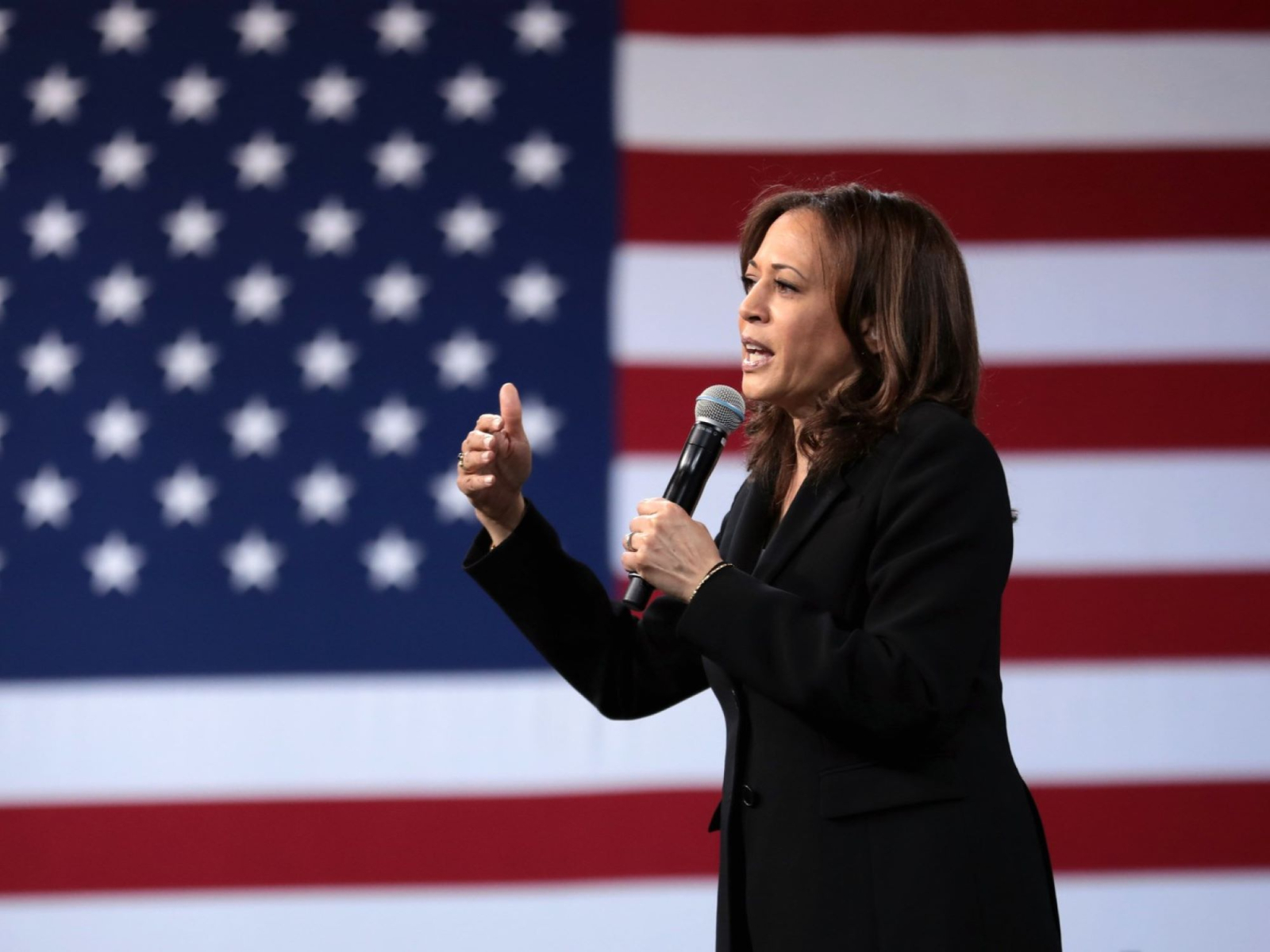The endorsement for Vice President Kamala Harris is growing by the hour, now that she has become the de facto Democratic nominee for U.S. president in place of Joe Biden, following his announcement on Sunday that he is withdrawing from the electoral race. In addition to President Biden himself (“I offer my full support and endorsement to Kamala as our party's nominee this year”), support has come from Alexandra Ocasio-Cortez, Bill and Hillary Clinton, Nancy Pelosi, and a large field of more than 100 senators and members of Congress ready to support Harris at the Democratic Convention (DNC) in Chicago, Aug. 19-22.
Notable absence from Barack Obama, who for the time being prefers to remain impartial should a new candidate be imposed by the convention, a stance already adopted with Joe Biden's candidacy in 2020 before Bernie Sanders withdrew from the race, a hallmark of his great statesmanship.
105 days, that's how long the exhausting and lengthy campaign will last if Kamala Harris, 59, from Oakland, California, succeeds in winning the nomination in late August. To win, she will have to successfully appeal to younger voters, the Latino, African-American and especially Asian-American communities (her mother Shyamala Gopalan is of Tamil-Indian descent), capturing the key states for the 2024 election, namely Arizona, Georgia, Michigan, Nevada, North Carolina, Pennsylvania and Wisconsin, the latter a traditionally Democratic state but snatched by Trump in 2016. These are all states where Kamala Harris will often be present, to gain the highest number of votes.
For the time being, however, she must bank everything on the consensus of the nearly 4,000 delegates and 700 super-delegates (former presidents, party leaders, elected officials) of the DNC who are expected to meet virtually by Aug. 7 to do a pre-screening on support for the nominee or any contenders who may yet emerge (but to do so they must collect signatures from at least 300 DNC delegates who have not already signed support). An open race, however, that should not waste too much time on the political campaign against her fearsome opponent, Donald Trump, greatly strengthened after the failed assassination attempt.
Kamala Harris and the green transition
For the readers of Renewable Matter, it is certainly of interest to understand where Kamala Harris will stand on America's ecological transition. “President Biden leaves office with the strongest record on climate change of any president in US history,” Jason Bordoff, the founding director of Columbia’s Center on Global Energy Policy, told CarbonBrief. “[Biden] worked with Capitol Hill Democrats to enact by far the largest climate bill in history. The 2022 Inflation Reduction Act provides hundreds of billions of dollars in tax subsidies and grants for low-carbon energy projects, supply chains, electric car purchases and far more. Biden also issued major emissions-cutting regulations; re-entered the Paris climate agreement that President Trump had abandoned; and wove climate into the fabric of decision-making across the government.”
Now, however, the insider question is: Will Kamala Harris be able to preserve her legacy and prevail against a candidate like Trump who has already promised to expand oil and gas extraction as much as possible? As a U.S. senator, Harris was in 2019 one of the first co-sponsors of the Green New Deal, a plan to transition the country towards generating 100 percent renewable electricity by 2030.
The Green New Deal was first introduced by Alexandria Ocasio-Cortez and Senator Edward Markey (former author of the first, failed 2010 climate proposal during the Obama administration) as a blueprint to bring media attention to the green transition and as a platform for progressive presidential candidates. Harris herself, in her 2020 primary campaign, presented a $10 trillion plan to bring the U.S. economy to net-zero emissions by 2045, seeking the vote of the younger generation, especially in California.
Certainly, the newly appointed presidential candidate has a strong track record of environmental and anti-oil and gas industry initiatives. In 2016, as California attorney general, she investigated ExxonMobil on suspicion that the multinational company had been misleading the public and its shareholders about the risks of climate change and that its public statements violated securities laws and other statutes. In 2015, she sued Plains All-American Pipeline over an oil spill off the California coast and obtained a criminal indictment of the company. The following year, she obtained an $86 million settlement for the state of California from Volkswagen over allegations that the company had cheated in diesel emissions testing.
A strong pro-abortionist, a theme on which she will play a good part of the campaign, a legal expert (key to her attacks on Trump on all the malfeasance), but also open to a less partisan and more moderate approach, climate will certainly be a core battle to win the younger vote, while paying attention to the issue of just transition and the economic and employment impact of the IRA and other potential economic reform proposals that may emerge in the coming months in Harris's plans. If elected, hers will be a decidedly more progressive presidency than Biden's, pushing for universal health care while calling for more generous tax benefits for working-class Americans, to be paid for with greater corporate tax increases.
The electoral challenge, ringing with dollars
Substantial donations are already flooding into Kamala Harris's presidential campaign. Just 24 hours after Biden stepped down, the vice presidential team is reported to have raised $49.6 million in donations from its voter base (a quarter of what Donald Trump has raised over the past few months), that is, excluding large private donors and superPACs, the Political Action Committees that cannot donate directly to candidates' campaigns, but can raise and spend any amount to support them indirectly.
A great start according to many commentators, although it is still a drop in the bucket compared to the treasure the candidate will have to amass in the coming months. According to the website OpenSecrets.org, which documents U.S. campaign contributions, more than $14.4 billion (about 13.2 billion euros) was spent on the 2020 election. Of this, about $5.7 billion went to the presidential campaign, including $2.4 billion to Joe Biden alone, double what Hillary Clinton raised in 2016.
But while in 2020, due in part to Covid, voters had great amounts of cash available; in 2024, due to U.S. inflation, contributions could shrink significantly, despite the polarizing rhetoric that is expected to dominate the media challenge. So it will not be easy for Harris to match Biden's performance.
In the meantime, however, Harris will be able to access the war chest accumulated by Joe Biden ($96 million) and already can count on the support of wealthy backers such as venture capitalist Reid Hoffmann, the progressive platform ActBlue, financier Alexander Soros (son of the Oracle of Omaha, George), and various members of the green energy industry, the entertainment industry, and the insurance industry.
“The floodgates will open”, Chris Korge, finance chair for the Biden Victory Fund, told NBC News. “There’s been a lot of people holding back contributions that will now contribute because the whole thing − that whole situation was paralyzing our fundraising.” But the big support will not only come from big donors. For Kamala Harris, a hyper-efficient digital and public campaign machine like Obama's will be needed in order to animate electoral communities and warm hearts. And perhaps get people to dig into their wallets.
This article is also available in Italian / Questo articolo è disponibile anche in italiano
Cover image: Kamala Harris © Gage Skidmore via Flickr



